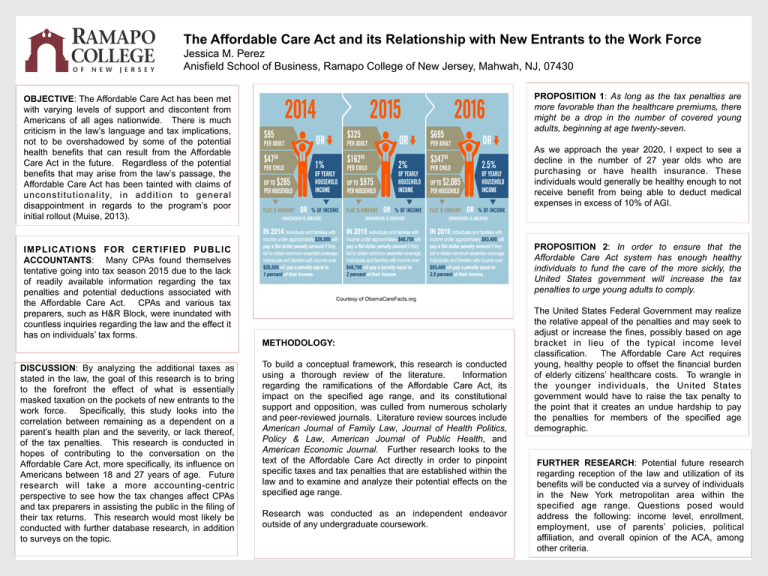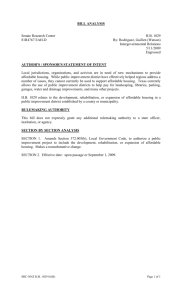The Affordable Care Act and its Relationship with New Entrants... Jessica M. Perez
advertisement

The Affordable Care Act and its Relationship with New Entrants to the Work Force Jessica M. Perez Anisfield School of Business, Ramapo College of New Jersey, Mahwah, NJ, 07430 OBJECTIVE: The Affordable Care Act has been met with varying levels of support and discontent from Americans of all ages nationwide. There is much criticism in the law’s language and tax implications, not to be overshadowed by some of the potential health benefits that can result from the Affordable Care Act in the future. Regardless of the potential benefits that may arise from the law’s passage, the Affordable Care Act has been tainted with claims of unconstitutionality, in addition to general disappointment in regards to the program’s poor initial rollout (Muise, 2013). IMPLICATIONS FOR CERTIFIED PUBLIC ACCOUNTANTS: Many CPAs found themselves tentative going into tax season 2015 due to the lack of readily available information regarding the tax penalties and potential deductions associated with the Affordable Care Act. CPAs and various tax preparers, such as H&R Block, were inundated with countless inquiries regarding the law and the effect it has on individuals’ tax forms. DISCUSSION: By analyzing the additional taxes as stated in the law, the goal of this research is to bring to the forefront the effect of what is essentially masked taxation on the pockets of new entrants to the work force. Specifically, this study looks into the correlation between remaining as a dependent on a parent’s health plan and the severity, or lack thereof, of the tax penalties. This research is conducted in hopes of contributing to the conversation on the Affordable Care Act, more specifically, its influence on Americans between 18 and 27 years of age. Future research will take a more accounting-centric perspective to see how the tax changes affect CPAs and tax preparers in assisting the public in the filing of their tax returns. This research would most likely be conducted with further database research, in addition to surveys on the topic. PROPOSITION 1: As long as the tax penalties are more favorable than the healthcare premiums, there might be a drop in the number of covered young adults, beginning at age twenty-seven. Place chart here As we approach the year 2020, I expect to see a decline in the number of 27 year olds who are purchasing or have health insurance. These individuals would generally be healthy enough to not receive benefit from being able to deduct medical expenses in excess of 10% of AGI. PROPOSITION 2: In order to ensure that the Affordable Care Act system has enough healthy individuals to fund the care of the more sickly, the United States government will increase the tax penalties to urge young adults to comply. Courtesy of ObamaCareFacts.org METHODOLOGY: To build a conceptual framework, this research is conducted using a thorough review of the literature. Information regarding the ramifications of the Affordable Care Act, its impact on the specified age range, and its constitutional support and opposition, was culled from numerous scholarly and peer-reviewed journals. Literature review sources include American Journal of Family Law, Journal of Health Politics, Policy & Law, American Journal of Public Health, and American Economic Journal. Further research looks to the text of the Affordable Care Act directly in order to pinpoint specific taxes and tax penalties that are established within the law and to examine and analyze their potential effects on the specified age range. Research was conducted as an independent endeavor outside of any undergraduate coursework. The United States Federal Government may realize the relative appeal of the penalties and may seek to adjust or increase the fines, possibly based on age bracket in lieu of the typical income level classification. The Affordable Care Act requires young, healthy people to offset the financial burden of elderly citizens’ healthcare costs. To wrangle in the younger individuals, the United States government would have to raise the tax penalty to the point that it creates an undue hardship to pay the penalties for members of the specified age demographic. FURTHER RESEARCH: Potential future research regarding reception of the law and utilization of its benefits will be conducted via a survey of individuals in the New York metropolitan area within the specified age range. Questions posed would address the following: income level, enrollment, employment, use of parents’ policies, political affiliation, and overall opinion of the ACA, among other criteria.


